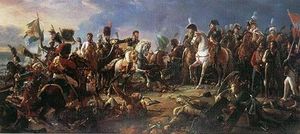
As noted earlier, I was encouraged by a friend to read War and Peace. That is a mighty request, but I think a lot of this person so I did.
Here are five things I disliked about the novel.
#1 - The Rampant Generalizations. Tolstoy makes a number of conclusions where he says that or this behavior was typical of "a young woman" or a "girl" or an "officer" or "person hunting" or whatever. I thought many of the conclusions wrong and that the tone was also wrong.
#2 - The Swooning and Reticules - there was a lot of very dated language. That should be expected for a novel written when this one was. But those things created a tone which like the first objection was a bit strange.
#3 - The Characters - What is the right number of characters for a novel of this dimensions? Probably about the number which Tolstoy used. But in many cases he seems to have chosen to expand on definitions of minor characters in odd ways. For even a person who appears only once - in several places Tolstoy adds a comment to explain their background. It led to some confusion A good way to read this book is with a characters guide.
#4 - The Language Switches I understand that the Russians at the time thought that culture of their nation was based on French. OK, I learned that in Russian Civ. At the same time, I am not sure why it was necessary to constantly explain that this or that character made a point in Russian or French. Droll but annoying.
#5 - Tolstoy's acceptance of the organizational structure of Russia - This is a tough one because a good deal of the novel, and in my mind the best parts are his inherent skepticism of bureaucracy, and yet there is a certain acceptance of the idiocy of the Russian system.
Here is what I liked most about the novel.
#1 - The Bs and Ds - For me the story was a set of contrasts between the two Bs - Andrei Bulkonski and Pierre Bezukhov and the two Ds - Dolkohov and Densihov. Prince Andrei is a complex character who goes through several stages. So does the silly Pierre. But Andrei is the better character - even though Pierre gets the better billing. Ditto for lesser characters Dolkohov and Densihov. They seem to have been written in the theory of contrasts. Tolstoy brings back some major themes in subtle ways with these four. They are important in the novel and you get a good idea about Tolstoy's thoughts about major human behaviors.
#2 - The Battle Scenes - Tolstoy knew how military courage worked. He also was able to portray several of the most important battles of the early part of the 19th century in magnificent ways. His description of Napoleon is stunning. Later, his description of a wolf hunt has the same kind of vivid description. He is a master of painting a word picture that brings the action alive. At the same time, he does a great job of exploring the interiors of his characters in these situations. The contrasts are excellent.
#3 - Economy of Irony - There are several wry comments that he throws in without remorse. For example, at one point he comments "At such moments Princess Mary would think how intellectual work dries men up."
#4 -The majesty of the issues raised The novel is long and complicated with a lot of investment to get to the meat. But his themes about the interaction of human beings in society, and royalty and battle is exceptional. I found it useful to have electronic searchable version of the book.. That sounds strange. But to get a sense of the book one needs to read it in chunks - but I found it useful to be able to go back without underlining.
#5 - The parodies - A lot of Russian literature has been captured in other devices including movies and books. But it starts with the model of the large piece that Tolstoy created here. Not many of us know much about the period of history that he wrote about. I knew the general outlines about Napoleon. But his coverage of social Russia, battles and moves was wonderful. Pierre is a 1960s flower child who begins and ends as sort of a buffoon moving from one social movement to another. Andrei on the other hand does similar moves but with much more interest and finesse. But the grand is always subject to the witty. Tolstoy, for the most part is not witty, but his scale and scope has allowed others to be.
This is a very long, very dated book, but it is also worth slogging through.



No comments:
Post a Comment